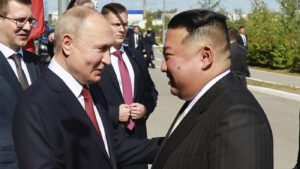Strengthening Ties: The Russia-North Korea Bridge Project

In a significant turn in global geopolitics, Russia and North Korea are bolstering their relationships with a major infrastructure project: the construction of a 4.7-kilometer bridge across the Tumen River, connecting the two nations more closely than ever. This milestone, as highlighted by Russian Prime Minister Mikhail Mishustin, symbolizes not just an engineering feat but a deepening of friendly ties aimed at enhancing trade and tourism.
The Bridge: A Catalyst for Trade and Cooperation
The bridge is expected to facilitate trade and tourism, significantly cutting transportation costs. Mishustin emphasized the project’s importance during a video meeting with Pak Thae-song, chairman of North Korea’s Supreme People’s Assembly. “The significance goes far beyond just an engineering task,” he remarked, underscoring a mutual desire for enhanced cooperation amidst harsh global sanctions.
As both nations grapple with severe restrictions and economic challenges, the bridge stands as a crucial lifeline. North Korea, facing acute shortages of food and essential goods, will benefit immensely from increased trade opportunities. The bridge promises to allow an influx of imported goods that could alleviate some of the dire humanitarian crises affecting its citizens.
Tourism Dynamics: Who Benefits?
Interestingly, the tourism aspect primarily caters to Russian citizens, as North Koreans face stringent restrictions on leaving their country. Attempting to flee is seen as an act of treachery and could result in severe penalties, including death. Government clearance is rarely granted, predominantly reserved for diplomats and the political elite. The new bridge will incorporate checkpoints to prevent unauthorized exits, maintaining a strict oversight on the movement of North Korean citizens.
Amidst these dynamics, reports have emerged about North Korea hosting summer camps for children of Russian soldiers who lost their lives in the ongoing conflict in Ukraine. Though such activities may foster tighter bonds between the two nations, it raises questions about whether Russian families would be comfortable sending their children to North Korea for leisure.
A Symbol of Alliance in a Changing World
With both countries possessing nuclear capabilities, their alliance is more crucial than ever, especially within the context of increasing global tensions. Speculation is rife about potential North Korean military participation in events like the Red Square parade on May 9, commemorating the end of World War II. It highlights a strategic partnership that transcend mere economics—one steeped in shared interests and geopolitical maneuvering.
Eyeing the Future
Sochi, the construction firm overseeing this project, aims for completion by 2026. The implications of this bridge extend well beyond construction; they signal a potential shift in regional power dynamics and cooperation amidst international isolation.
For investors and analysts closely monitoring these developments, it’s essential to stay informed about the evolving landscape of Russia-North Korea relations. As history has shown, infrastructure projects often pave the way for new political alliances and economic opportunities. With the Extreme Investor Network, you’ll receive continuous updates and in-depth insights into these crucial developments, helping you navigate the ever-changing world of economics with confidence.
Stay tuned as we explore the implications of this bridge on global trade, politics, and investment opportunities. Your pathway to informed decision-making starts here!

